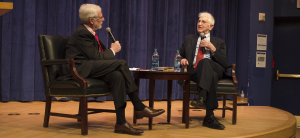
Vice President for Global Engagement Thomas Banchoff, left, interviewed Daniel Ellsberg, the former Pentagon employee who leaked a series of classified documents profiling the Nixon administration’s deception over the war in Vietnam in 1971, at a symposium on the leaking of the Pentagon Papers and their legacy.
The leaking of classified information is in the national interest, according to Daniel Ellsberg, the former Pentagon employee responsible for leaking the Pentagon Papers, at a symposium discussing the leaks and their legacy Feb. 16 and 17.
“More people ought to be revealing this secret information,” Ellsberg said. “The public needs to know. Congress needs to know. Lives depend on it. The Constitution is being violated.”
The symposium, “Free Speech Legacies: The Pentagon Papers Revisited,” featured a series of panel discussions on the leak and its legacy. Martin Baron, executive editor of The Washington Post, and Bob Woodward, the Washington Post journalist who broke the Watergate Scandal with journalist Carl Bernstein, spoke at the symposium.
Sanford Ungar, a professor at the Institute for the Study of Diplomacy, organized the symposium; it was sponsored by the President’s Office, the Journalism Program and the Berkley Center for Religion, Peace and World Affairs. Ungar wrote about the legal and political battles pertaining to the Pentagon Papers in his book, “The Papers and the Papers.”
While working as a strategic analyst at the RAND Corporation in 1967, Ellsberg worked on a top-secret study commissioned by then-Defense Secretary Robert McNamara regarding U.S. policy and decision-making in Vietnam from 1945 to 1968. The report revealed extensive dishonesty from four different administrations, including President Richard Nixon’s secret expansion of U.S. involvement in the Vietnam War.
In 1971, Ellsberg leaked the classified 7,000-page report to The New York Times. Ellsberg was tried on 12 felony counts under the Espionage Act and theft of government property for revealing the documents, charges carrying a possible sentence of 115 years. The case was later dismissed as a mistrial on the grounds of illegal and unethical conduct by the prosecution.
Thomas Banchoff, who is Georgetown’s vice president for global engagement, and introduced the keynote speaker, said the issue of government leaks today is just as important as it was in 1971 when Ellsberg first leaked the Pentagon Papers.
President Donald Trump has accused the intelligence community of making a series of leaks to the media, including information leading to the resignation of former National Security Advisor Michael Flynn Feb. 13.
“Now, given where we are today, with the great tension between the White House and the mainstream media, this is indeed the ideal moment to look back at the multiple legacies of a case from 1971, which had the country and the whole world on edge,” Banchoff said.
Ellsberg said the leaks conducted by Chelsea Manning, who leaked almost 1 million classified documents to WikiLeaks in 2010, and Edward Snowden, who leaked a series of documents from the National Security Agency to The Guardian and The Washington Post in 2013, are in the national interest. President Barack Obama commuted Manning’s 35-year sentence Jan. 13.
“Manning and Snowden and I all were in the same situation. No one else was going to do it, someone had to do it, so I did it. That is what I would like people to hear,” Ellsberg added. “There is no guarantee at all that it would have any effect. However, as Snowden said, there are things worth dying for.”
Ellsberg said he was motivated to leak the documents after he learned the Nixon administration had no intention of pulling U.S. military out of Vietnam as it had claimed. Ellsberg said he hoped releasing the report would assist in putting a stop to U.S. involvement in the war.
“The real decision was primarily in 1969 when I became aware that President Nixon didn’t have in mind ending the war as he had campaigned on,” Ellsberg said. “I felt a responsibility to go beyond what I otherwise would have done to try and end it, and liberate us from that war. I felt that I should do what I could and that included putting out those 7,000 pages of history.”
Ellsberg first delivered the papers to members of Congress, hoping they would spark Congressional hearings. However, after his efforts to release the information through official channels failed, Ellsberg decided to take the material to The New York Times reporter Neil Sheehan in 1971.
Ellsberg said he believed at the time he might go to prison. However, he felt that the opportunity to potentially end U.S. involvement in Vietnam was worth the risk.
“I wanted to generate an effect – for the war to end. And it didn’t do that,” Ellsberg said. “It was a miraculous set of circumstances that happened together which kept me from going to prison.”




















